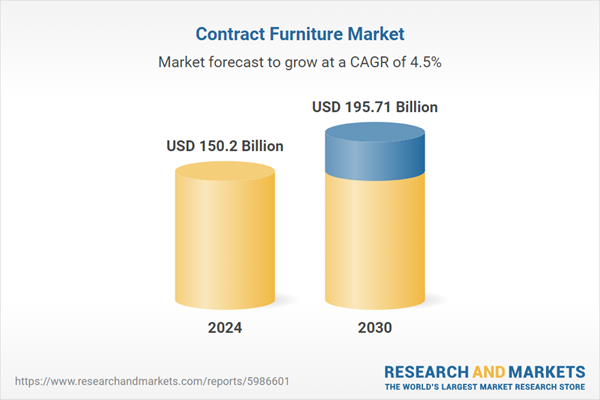Sofa & Couch is the fastest growing segment, Asia-Pacific is the largest market globally
Speak directly to the analyst to clarify any post sales queries you may have.
10% Free customizationThis report comes with 10% free customization, enabling you to add data that meets your specific business needs.
Key Market Drivers
The global contract furniture market is profoundly influenced by expanding commercial real estate development and the evolution of office design alongside hybrid work models. Expanding commercial real estate directly fuels demand for extensive furniture installations across sectors. For instance, according to JLL, in their "Global Real Estate Perspective" published in August 2025, global direct transaction activity in commercial real estate totaled US$179 billion in the second quarter of 2025, reflecting a 14% rise year-over-year. This sustained investment in hospitality, healthcare, and educational facilities necessitates durable, functionally specific furniture.Key Market Challenges
The global contract furniture market faces a significant challenge from the persistent volatility in raw material costs. This directly impedes market growth by increasing production expenses for manufacturers. For instance, according to the Institute for Supply Management, raw material prices for manufacturers experienced a rise of 4.1% in 2023. Such increases erode profit margins and necessitate higher selling prices, which can deter commercial and institutional buyers, thereby slowing procurement cycles and overall sales volume within the sector.Key Market Trends
The contract furniture market increasingly prioritizes sustainable practices and eco-friendly materials, driven by heightened environmental awareness and corporate responsibility. This involves the greater use of recycled content, rapidly renewable resources, and low-VOC finishes, aligning with stringent environmental standards and certifications sought by clients. According to the Business and Institutional Furniture Manufacturers Association, the updated BIFMA e3-2024 Furniture Sustainability Standard, released in April 2025, now incorporates four distinct certification levels, reflecting an advanced industry commitment to environmental stewardship.Key Market Players Profiled:
- Haworth Inc.
- Quality Woods Furniture
- Kinnarps AB
- Steelcase Inc.
- HNI Corporation
- MillerKnoll, Inc.
- Global Upholstery Co. Inc.
- Kimball International, Inc.
- Teknion Corporation
- OFS Brands Holdings Inc.
Report Scope:
In this report, the Global Contract Furniture Market has been segmented into the following categories:By Type:
- Chairs & Stools
- Tables & Desks
- Storage Furniture
- Sofa & Couch
- Others
By End User:
- Students
- Teachers
- Government Officials
- Corporation Managers
- Enterprise Owners
- Workers
- Others
By Distribution Channel:
- Offline
- Online
By Region:
- North America
- Europe
- Asia Pacific
- South America
- Middle East & Africa
Competitive Landscape
Company Profiles: Detailed analysis of the major companies present in the Global Contract Furniture Market.Available Customizations:
With the given market data, the publisher offers customizations according to a company's specific needs. The following customization options are available for the report:- Detailed analysis and profiling of additional market players (up to five).
This product will be delivered within 1-3 business days.
Table of Contents
Companies Mentioned
- Haworth Inc.
- Quality Woods Furniture
- Kinnarps AB
- Steelcase Inc.
- HNI Corporation
- MillerKnoll, Inc.
- Global Upholstery Co. Inc.
- Kimball International, Inc.
- Teknion Corporation
- OFS Brands Holdings Inc.
Table Information
| Report Attribute | Details |
|---|---|
| No. of Pages | 186 |
| Published | November 2025 |
| Forecast Period | 2024 - 2030 |
| Estimated Market Value ( USD | $ 150.2 Billion |
| Forecasted Market Value ( USD | $ 195.71 Billion |
| Compound Annual Growth Rate | 4.5% |
| Regions Covered | Global |
| No. of Companies Mentioned | 10 |









